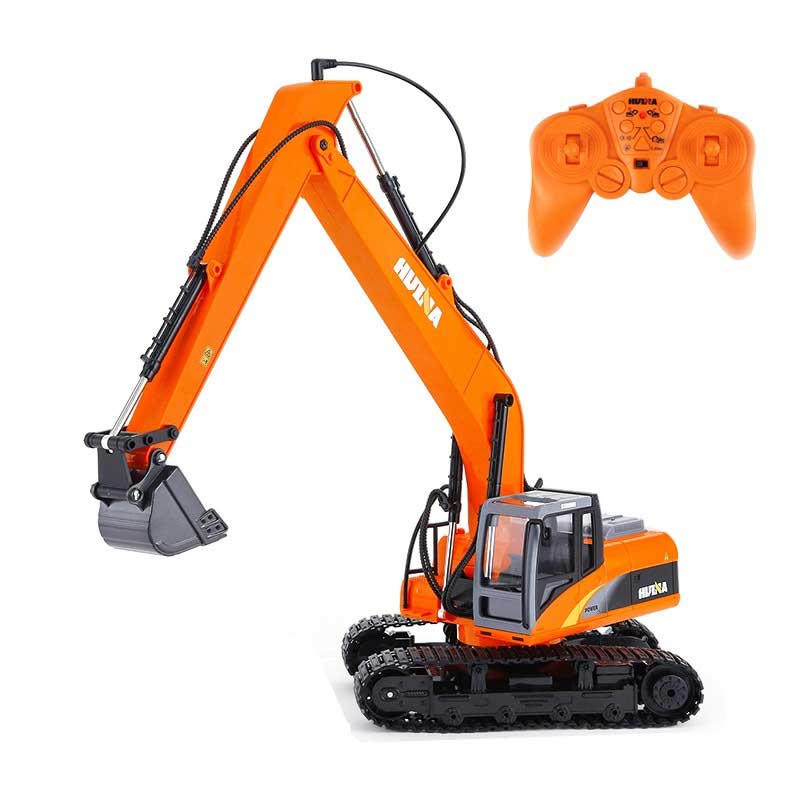Recognizing How Excavator Functions and Its Influence on Efficiency
Excavators play a crucial role in construction and mining procedures, counting on a complex interplay of hydraulic and mechanical systems. Their capability to perform a variety of jobs rests on both their style and the technology incorporated within. Understanding these components can greatly impact functional effectiveness and performance. As developments proceed to reshape the market, one should take into consideration how these modifications will affect future practices and performance.
The Essentials of Excavator Mechanics

The Function of Hydraulic Solutions in Excavators
At the heart of excavator procedure lies the hydraulic system, which plays a critical function in powering the device's activities and features. This system uses pressurized hydraulic fluid to transfer energy, enabling various activities such as lifting, moving, and excavating. By taking advantage of the principles of hydraulics, excavators can carry out jobs with impressive precision and force, boosting total operational efficiency.The hydraulic system is composed of crucial parts, consisting of pumps, cyndrical tubes, and shutoffs, which function with each other to manage the circulation and instructions of the liquid. When the operator engages the controls, the hydraulic fluid is directed to details cylinders, equating the operator's commands right into physical motion. This system enables for receptive and smooth actions, which are important in building and construction and excavation atmospheres. double e volvo rc excavator. The performance of the hydraulic system straight influences the productivity and adaptability of the excavator, making it an important component in modern-day excavation procedures
Secret Elements of an Excavator
Comprehending the vital components of an excavator is vital for understanding exactly how this powerful maker runs. An excavator consists of a number of significant aspects, consisting of the undercarriage, house, arm, container, and boom. The undercarriage supplies stability and movement, often including wheels or tracks to navigate different surfaces. Your home contains the engine and hydraulic systems, permitting the operator to manage motion and power the maker. The boom expands from the house, making it possible for vertical reach, while the arm links to the container, promoting excavating and lifting operations.Additionally, the cab houses the operator, geared up with controls for precise maneuvering. Each of these parts plays a vital function in the excavator's general performance, adding to its effectiveness and effectiveness on building sites. Comprehending these parts assists in keeping and optimizing excavator efficiency, making sure tasks are completed securely and properly.
Attachment Convenience and Its Benefits
Accessory convenience is a crucial facet of excavators, enabling operators to switch in between numerous devices customized for certain jobs. This flexibility not just boosts work performance yet additionally adds to cost-effectiveness by lowering the demand for several devices. Understanding the different sorts of accessories available can considerably impact the general efficiency and capability of an excavator on job sites.
Kinds of Accessories
While excavators are largely identified for their excavating capabilities, their true versatility hinges on the wide selection of attachments readily available. These accessories improve the excavator's functionality, enabling it to do numerous tasks past excavation. Common add-ons include pails (for excavating and scooping), hydraulic thumbs (for realizing products), and augers (for piercing holes) Grapples are used for managing and moving particles, while rippers can damage up difficult surfaces. Other specialized add-ons, such as plates and rakes, allow excavators to adapt to particular job demands. This diversity not only raises the maker's utility throughout various industries, including landscape design, demolition, and construction, however also permits drivers to customize their tools to fulfill particular task needs successfully.
Enhanced Work Efficiency
Making the most of task efficiency is a main advantage of making use of various excavator add-ons. Different attachments enable an excavator to do multiple tasks without requiring to switch equipment, conserving beneficial time and labor. Making use of a hydraulic hammer can break concrete while a pail accessory can excavate soil, making it possible for a smooth process. This versatility decreases downtime related to devices changes and boosts performance on-site. Additionally, specialized accessories enhance precision in tasks such as grading or landscape design, causing better results. The capability to adjust to numerous task needs not just enhances procedures however likewise lessens the requirement for extra equipment, guaranteeing that projects are completed swiftly and successfully. In general, add-on convenience substantially adds to increased work performance in excavation job.
Cost-Effectiveness and Adaptability
Cost-effectiveness is a substantial benefit of using functional excavator add-ons. These add-ons enable a single excavator to perform multiple tasks, decreasing the requirement for added machinery and labor - double e volvo rc excavator. By switching in between containers, hammers, and grapples, operators can tackle different tasks, from excavating to demolition, consequently maximizing devices usage. This versatility not just lowers functional expenses but also reduces downtime associated with altering tools. Furthermore, the capacity to tailor excavators with specialized add-ons improves efficiency, as they can efficiently deal with diverse jobs according to job needs. In conclusion, the mix of cost-effectiveness and versatility in excavator accessories adds to improved operational efficiency and source allotment in building and construction and excavation tasks

Advanced Modern Technology in Modern Excavators
Modern excavators are increasingly geared up with advanced innovation that changes excavation processes. Automation simplifies procedures, while improved fuel efficiency decreases operational prices. In addition, smart control systems improve precision and safety and security, marking a significant development in excavation tools.
Automation in Excavation Processes
As excavation modern technology evolves, automation has actually emerged as an important part in boosting efficiency and precision on job websites. Modern excavators are furnished with advanced automated systems that help with jobs such as grading, digging, and trenching with very little driver treatment. These systems utilize sensors, GPS, and artificial intelligence algorithms to guarantee precise positioning and depth control, substantially reducing the margin for mistake. Furthermore, automation permits drivers to focus on critical decision-making instead of manual controls, resulting in improved performance generally. Such technologies not only streamline workflows yet likewise improve safety and security by reducing human mistake in complex operations. The integration of automation in excavation processes represents a considerable improvement in building innovation, driving the industry towards greater efficiency and effectiveness.
Boosted Gas Effectiveness
Developments in innovation have actually also led to considerable improvements in gas performance for contemporary excavators. Modern machines are equipped with sophisticated engines that enhance power outcome while minimizing gas intake. These engines use innovative combustion technologies, such as turbocharging and straight gas injection, to boost efficiency and effectiveness. Additionally, lightweight products in building reduce total weight, allowing for less power expenditure during procedure. The intro of variable rate controls enables drivers to readjust engine performance according to specific jobs, further minimizing fuel use. As a result, these enhancements not just lower functional expenses but also add to ecological sustainability by lowering exhausts. Generally, improved fuel performance in excavators is an important advancement that reinforces efficiency and economic stability in the construction sector.
Smart Control Systems
While drivers navigate progressively intricate work websites, clever control systems in excavators have emerged as vital tools for improving performance and accuracy. These sophisticated innovations utilize algorithms and sensing units to monitor different criteria such as lots weight, terrain conditions, and functional efficiency. By instantly readjusting hydraulic functions, wise systems maximize device performance, causing boosted efficiency and reduced wear on parts. Additionally, operators gain from user-friendly interfaces that supply real-time comments and diagnostics, enabling for educated decision-making. This assimilation of technology not only enhances operations yet also minimizes human mistake, adding to much safer work settings. As the building and construction sector proceeds to develop, smart control systems will play a crucial duty fit the future of excavator performance and performance.
Enhancing Operational Efficiency With Excavators
Excavators play a crucial duty in boosting operational efficiency across continue reading this numerous building and excavation projects. Their convenience permits numerous tasks, consisting of material, excavating, and training handling, which simplifies operations and decreases the requirement for extra tools. With powerful hydraulic systems, excavators can execute durable tasks with precision, significantly decreasing the moment required to full projects. The assimilation of advanced innovation, such as GPS and automated controls, further Discover More Here maximizes their operation, making it possible for operators to accomplish higher accuracy and lower product waste. Furthermore, contemporary excavators are created to consume much less gas and reduce emissions, adding to both cost savings and environmental sustainability. By using excavators successfully, building groups can boost performance, fulfill project target dates, and boost total site management. This multifunctionality and performance make excavators indispensable devices in the modern building and construction landscape.
The Future of Excavators in Building And Construction and Mining Industries
As the building and mining sectors evolve, the future of excavators is positioned for substantial transformation driven by technical development and transforming operational demands. Advances in automation and fabricated knowledge are improving excavator capabilities, permitting enhanced precision and performance in operations. Autonomous excavators are arising, lowering the need for human treatment and reducing the threat of accidents.Moreover, the combination of telematics and IoT innovation makes it possible for real-time monitoring of maker performance and anticipating maintenance, optimizing uptime. Environment-friendly styles, consisting of electrical and hybrid versions, are getting traction, straightening with sustainability objectives within the industry.Additionally, making use of advanced materials and lighter designs enhances fuel effectiveness while keeping performance criteria. As these patterns progression, excavators will certainly play a crucial duty in satisfying the boosting demands for efficiency and safety in building and mining, inevitably transforming operational landscapes.
Regularly Asked Inquiries
Just How Do Climate Conditions Affect Excavator Efficiency?

Weather condition problems greatly affect excavator efficiency, as rain and mud can hinder grip and security, while severe temperatures might affect hydraulic systems. Operators has to adjust to these variables to guarantee perfect capability and safety and security throughout operations.
What Safety And Security Measures Should Operators Comply With While Utilizing Excavators?
Safety and security procedures for excavator drivers consist of putting on suitable individual safety tools, carrying out pre-operation evaluations, making sure correct communication with ground personnel, preserving a secure distance from above hazards, and sticking to well-known functional procedures to stop crashes.
Exactly How Frequently Should Excavators Be Preserved for Ideal Performance?
Excavators should be preserved frequently to ensure peak efficiency, usually every 250 operating hours or as defined by the maker. Routine checks enhance dependability, avoid unanticipated failures, and extend the life expectancy of the equipment.
What Is the Average Life-span of an Excavator?
The typical life-span of an excavator generally ranges from 10,000 to 15,000 hours of operation. Elements influencing durability consist of upkeep methods, running problems, and the high quality of the machine itself, influencing general efficiency and efficiency.

Can Excavators Run on Irregular Terrain Successfully?
Excavators can operate efficiently on irregular surface because of their verbalized designs and flexible tracks. These attributes permit them to preserve stability and grip, making it possible for reliable procedure in tough atmospheres frequently run into in building and construction and landscape design projects. Each of these elements plays a vital role in the excavator's overall functionality, contributing to its efficiency and effectiveness on construction websites. Making the most of job efficiency is a main advantage of utilizing various excavator accessories. While drivers browse progressively intricate work sites, wise control systems in excavators have actually emerged as important devices for boosting effectiveness and accuracy. Excavators play a vital duty in boosting operational performance throughout numerous construction check that and excavation projects. Advancements in automation and fabricated intelligence are reshaping excavator abilities, enabling for boosted precision and effectiveness in operations.